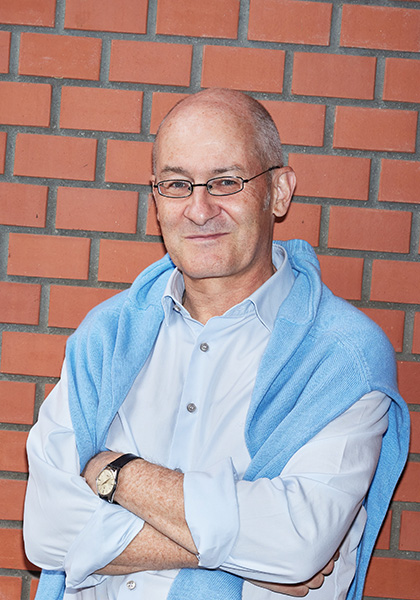Navigation auf uzh.ch
Navigation auf uzh.ch

Why does someone become a perpetrator? What’s it like to live in a country where corruption is commonplace and people often have no choice but to accept bribes? These are some of the questions which law practitioners have delved into before becoming novelists. Felix Uhlmann, professor of administrative law at the University of Zurich, published his debut novel Der letzte Stand des Irrtums last spring. His book tells a story in which the logic of violence becomes unavoidable. Oliver Diggelmann, UZH professor of international law, is the author of two novels. His second book, Die Lichter von Budapest, was published in March and explores corrupt dealings in Hungary.
Both Diggelmann and Uhlmann are full-time legal scholars as well as sought after media commentators. Oliver Diggelmann specializes in matters of international law, including the war in Ukraine, the freezing of Russian Central Bank assets, international tribunals and neutrality questions. His colleague Felix Uhlmann is an expert in constitutional and administrative law and has delved into issues such as the limitations of the constitutional state during the Covid pandemic and questions surrounding stolen art. He made a name for himself in relation to the Curt Glaser art collection at Kunstmuseum Basel and is in charge of the round table on reseraching the provenance of the Bührle collection held at Kunsthaus Zurich.
With all the expert reports, judicial statements and legal opinions, where do Diggelmann and Uhlmann find the time and leisure for writing books? The professors shrug their shoulders. Writing fiction happens on the side – at weekends, when traveling and during short breaks.
Diggelmann and Uhlmann aren’t alone with their passion for literature. There is in fact quite a large number of law practitioners who are also successful writers. They include the highly accomplished author and judge Juli Zeh, bestselling novelist and legal scholar Bernhard Schlink and the author and defense lawyer Ferdinand von Schirach, to name just a few. This hints at a common urge to escape from the constrictions of legal language, which demands correctness and unambiguity. Thus, in the shadows of places where laws and indentures are meticulously written and defined, where evidence and proof are strictly required, a circle of writers with a thirst for literary creativity has formed. This is not a new phenomenon.
“On weekdays I’m a lawyer and perhaps a bit of a musician, Sunday daytime is for drawing and in the evening I’m a very witty author until late into the night,” E.T.A. Hoffmann wrote more than 200 years ago. Alongside his regular occupation as a judge, he was the creator of numerous literary and musical works. Others struggled with the legal system. Heinrich Heine, for instance, was utterly incensed by Roman law: “These thieves (meaning the Romans) wanted to safeguard their spoils, and what they had captured with the sword they sought to protect with laws (...).”
Heine, who had a PhD in law, accused advocates of twisting and turning legislation until it suited their purposes. Only few knew Franz Kafka’s views on his work. He was employed as a junior lawyer to handle appeals at the Worker’s Accident Insurance Institute for the Kingdom of Bohemia, of which he said: “My job is unbearable to me, as it goes against my only desire and my only calling, which is literature.” For some, writing fiction was a way to complement their work as law practitioners, allowing them to express their own perspectives on legal issues. In his Gretchen tragedy, Goethe, who was an advocate as well as a privy councilor and minister of state at the Court of Weimar, explored whether infanticide should carry the death penalty. The books by Felix Uhlmann and Oliver Diggelmann equally feature different legal dimensions, as both narratives deal with violence and crime.

Writing fiction probably allows me to do justice to the contradictory nature of people or a country in a way that isn’t possible in my legal analyses.
Is it that literature offers an alternative channel for continuing to reflect on questions around law and justice? For Oliver Diggelmann, the novel is a more appropriate medium for delving into complicated realities. “Writing fiction probably allows me to do justice to the contradictory nature of people or a country in a way that isn’t possible in my legal analyses,” he explains.
His book tells a tale of amorous entanglements and cronyism, exploring how EU funds trickled away almost without trace in post-socialist Hungary. From a legal perspective the case is clear – the country isn’t adhering to the rule of law standards that apply in the EU. But there are reasons for this. There’s a history behind it that isn’t so easy to shake off – and which many aren’t even willing to shake off.
“We western Europeans are so used to well-functioning institutions that we often have little understanding of all the necessary prerequisites for the rule of law to prevail,” says Diggelmann. From 2004 to 2010, he held a professorship position on international and constitutional law at the University of Budapest. He says it was a formative time. The continuous trickery, often ingenious in nature, was immediately apparent to him. “But the stories of the people behind the deception can only partially be grasped through the sober and established terms of academia.” Anatol, the protagonist in Diggelmann’s novel, is an English teacher who tries to uncover the criminal machinations at the law firm where his girlfriend somewhat naively works. A shady friend reproaches him for his western European arrogance: “It’s not up to you to change this country.
To a certain extent, Diggelmann’s own discomfort about being a “history tourist” also informed his writing. For him, writing a novel offers the opportunity to dig deeper into baffling issues. In an ideal scenario, it brings to light its own truth, which jurisprudence isn’t interested in. “One aspect of this truth is this: when the institutions aren’t working properly, you only ever rely on people you know well,” Diggelmann adds. He feels that literary language is a more suitable form for doing justice to the iridescent world of post-socialist Budapest.
Felix Uhlmann says his legal background finds direct expression in the language he uses, the specific focus on something. “Perhaps it’s a reduction to the essential,” he says. His narrative style is indeed highly condensed. The nameless protagonist, an engineer, is uncommunicative and never says a word too much. He fits gearboxes into cars. The same automatism that characterizes the protagonist’s high-precision work seems to permeate the entire narrative, which increasingly spirals towards violence. There’s no space for reflection, the events are guided by a pointless, blunt logic of violence.

The logic of senseless violence, repression and marginalization - I feel these are overarching mechanisms.
For Uhlmann, the freedom offered by language and fiction, the radical approach this enables, is what sets his writing apart from his work as a legal scholar. Unlike expert reports and evaluations, fiction requires no evidence, differentiation or proof. He can allow the story’s outcome to remain open. He doesn’t have to decide anything. On the contrary, it’s this suspension, the ambiguity, that gets his readers thinking. Whether and to what extent the protagonist is a victim or perpetrator remains open in Uhlmann’s story. The ambivalence has to be endured.
The reader initially sympathizes with the protagonist, who appears to belong to a minority group. He is baselessly arrested and detained in a camp, where repression and violence draw ever closer and the protagonist himself becomes a perpetrator. The despondency is expressed in the minimalist language, and in the short sentences and short chapters that leave little room for hope. A childhood love seems to be the only ray of light. But even here, any possible salvation founders on the protagonist’s inability to communicate.
So where do law practitioners-turned-authors find the material for their books? The stories in Ferdinand von Schirach’s novels, which include titles such as Crime and Guilt, are often directly adopted from his daily work at the law firm. As an advocate, he has defended rapists, murderers and other criminals in court, and his tales are based on real events. Author Bernhard Schlink takes a different approach. When asked why he, as a lawyer, also writes fiction, he once answered: “Perhaps because the truth of law lies in words and sentences, just like the truth of stories, and because here as there, things need to be brought to a close.” In his writing, Schlink repeatedly reflects on questions of guilt, involvement and responsibility during the Nazi era. His book The Reader, published in 1995, tells of the love affair between a 15-year-old youth and an older woman who is a tram ticket collector and a war criminal.
What is it that drives law practitioners to write? For Felix Uhlmann, it was the big, elemental questions that preoccupied him time and again. What are people like, and what are they capable of? He intentionally didn’t set his story in any specific time or place – although associations with the Second World War, the Yugoslav Wars or the genocide in Rwanda are possible. “I feel these are overarching mechanisms, the logic of senseless violence, repression and marginalization,” Uhlmann says in a conversation that took place before the most recent escalation of violence in the Middle East.
His initial interest was in examining the senseless logic of violence. Uhlmann’s narrative radically explores the thinkable, thereby delving into the dark side of humanity. For Oliver Diggelmann, a personal connection to the material is important in fictitious writing. He was keen to capture the mood of the era he witnessed and the political issues of that time. He is fascinated by the uniqueness of any given period and the stories of its people, especially when these stories are disappearing. For his second book, this was the noughties in Hungary, the post-socialist bohemian world with its own rites and aesthetics. In his debut novel Maiwald, he wrote about the protest movements of 1968 and the 1980s, which had a formative influence on his generation. “My current students only have a limited understanding of those times,” says Diggelmann. He feels opportunities to rebel against the authorities are limited these days, with everyone pretending to be your friend. Why did it take courage to protest? What were the risks? What became of the hopes? “Fictional writing keeps the people of a particular era alive,” he adds.
For both authors, literary work offers an opportunity to process experiences and impressions outside of academia. The nature of academic writing is to encapsulate things succinctly. Events are made comprehensible with the clearest possible concepts. In contrast, literary writing allows the author to broaden the horizons by leaving things hanging in the balance. Both books finish with an open ending. Will the lovers find each other? What will Anatol do with his knowledge, and will his former girlfriend be prosecuted? Will the nameless protagonist make a future for himself at his place of refuge? What about his childhood love who remains behind? The questions are left unanswered, just as they are in real life. And the stories carry on developing in the minds of the readers.